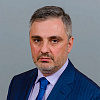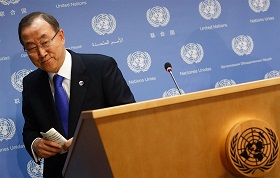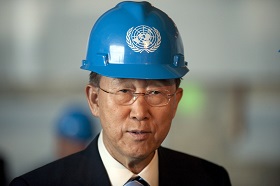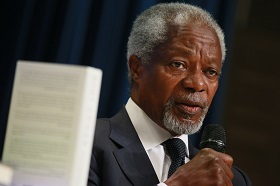The end of Ban Ki-moon's term as UN Secretary-General in 2016 and the forthcoming elections of his successor (the first round of Security Council voting on the candidates is scheduled for July 21, 2016) will provide an occasion for the international community not only to choose a candidate who they feel would best serve everyone’s interests, but also to reflect on further transformations of the global Organisation's system.
By tradition, UN Secretary-Generals are chosen in turn from among representatives of various regions of the world who come from countries that are not permanent members of the UN Security Council (to rule out monopolisation of influence within the UN). In terms of regional rotation, which is informal, the group of East European countries believes it is their turn to endorse a candidate. The rule for filling the post of Secretary-General in rotation between regional groups is not hard and fast and, from past experience, not always scrupulously followed. For instance, during the more than 70-year history of the UN, of the five regional groups, only representatives of the East European group have never held the post of Secretary-General.
The process for selecting the candidate for a future UN Secretary-General is the result of complicated compromises and secret deals among states. In this process, the five permanent Security Council members – Russia, China, the USA, Great Britain and France – play first fiddle. The history of the UN offers plenty of examples of the “Five" rejecting candidacies of politicians of world stature (for example, Charles de Gaulle, Dwight Eisenhower and Anthony Eden). In addition, practice shows that UN member states are not interested in having an overly independent Secretary-General.
The current election process is taking place amid mounting criticism of the UN over the falling prestige and effectiveness of its Security Council. How justified are these claims and what baggage is Ban Ki-moon leaving behind for his successor?
Through the hardship of global responsibility
It is significant that UN Secretary-Generals who have tried to pursue a line independent from Washington have encountered serious problems in their activities. The sixth Secretary-General, Boutros Boutros-Ghali of Egypt, was known, for instance, as a staunch opponent of American policy in the Balkans. As a result, Washington vetoed his re-election for a second term. His successor, Kofi Annan (Ghana), rightly described as "illegal and in contravention of the UN Charter" the military intervention by the US and several of its allies in Iraq in 2003, thus incurring American accusations of allegedly deriving personal benefits from implementation of the UN's "oil-for-food" programme in that country. Subsequent investigation did not find any wrongdoing on Kofi Annan's part.
Consequently, it was suggested that the next Secretary-General of the UN should be an impeccable bureaucrat who would keep out of politics, the George Bush Administration stressed.
Nevertheless, when Ban Ki-moon became the eighth Secretary-General, the advocates of a stronger UN were sceptical. "Is that all there is?" asked Samantha Power in a New Statesman interview in 2008. "Can we afford to do without a global figure, a global leader?" Five years later, she would have to retract her words when she was appointed US Ambassador to the UN.
It has to be admitted that fears concerning an uncharismatic UN Secretary- General did not prove to be entirely groundless. Diplomats have been saying privately that, in spite of Ban Ki-moon's proclaimed aim of making the UN more effective, the attempts by the former South Korean Foreign Minister to use his "methods" at the UN have not always fit into the diversified UN mechanism.
For example, shortly after assuming office, Ban Ki-moon faced fierce resistance to his plans to change the structure of an important UN Secretariat department. Diplomats explained in private conversations that the UN Secretary- General had broken the UN tradition by making public issues that had not yet been properly worked on at the level of the missions accredited to the UN. The member countries, whatever their political weight, are ever ready to remind the Secretary- General that he is "secretary" first and "general" second.
Moreover, not everyone on First Avenue was pleased with the "impermeability" of the Secretary-General's inner circle, initially represented by three South Korean advisers who, like Ban Ki-moon, were not quite familiar with the way things were done at the UN.
Unlike Kofi Annan, who preceded him, Ban Ki-moon soft-pedalled the issue of reforming the UN Security Council. One reason for this, it was suggested, was that Japan is a potential contender for a permanent seat on the SC, which greatly irritates Seoul.
Although the Syrian crisis was at the top of the agenda during Ban Ki-moon's second term as UN Secretary-General, he did not take an active part in resolving the crisis. In September 2014, when the US decided to launch a military operation in Syria without the UN SC sanction and the consent of the legitimate Syrian government, Ban Ki-moon refrained from qualifying that move, avoiding criticism of US air strikes without confirming their legitimacy. He was perhaps mindful of the consequences for Kofi Annan of his principled assessment of unlawful invasion of Iraq by the US, backed by Britain and Australia.
Considering Ban Ki-moon's origins, he was expected to contribute more to settling the situation between the two Koreas, especially since it was a priority in his election programme. Yet, during his ten years in office, Ban Ki-moon never visited the DPRK, although such a visit could have given a great impetus not only to development of the relations between the two Koreas but also to resolving the Korean nuclear problem. A real chance to visit Pyongyang was missed in late 2015. According to well-informed sources, Ban Ki-moon's visit was prevented by Seoul failing to give the go-ahead. Even so, according to Article 100 Chapter XV of the UN Charter, "In the performance of their duties, the Secretary-General and the staff shall not seek or receive instructions from any government or from any other authority external to the Organisation."
However, Ban Ki-moon can safely claim credit for the approval, in September 2015, of the Global Development Agenda Beyond 2015 and the approval in December of 2015 of the Paris Agreement, a comprehensive new document for the period after 2020, determining the framework for international collaboration on climate issues.
Looking ahead
The programme statements made by the candidates for UN Secretary-General – there are currently 12 of them – proclaim their readiness to raise to a new level the solution of pressing issues on the UN agenda, such as reform of the Security Council, nuclear security and progress on disarmament, the fight against terror, peace-keeping and the issues of human rights, implementation of the Global Sustainable Development Agenda, tackling climate change, etc.
The focus is on the need to bring the UN structure and mechanisms in line with modern reality. Indeed, any complicated organism, including such a multi-dimensional and all-embracing one as the UN, needs regular maintenance, rebalancing and fine-tuning. It is another (and crucial) question whether the UN system is in need of a drastic overhaul involving a revision of its bedrock principles that form the basis of its structure and its backbone.
Is the UN really so far behind the times as to be incapable of performing its mission as described in Article 1, Chapter I of its Charter, i.e., "To maintain international peace and security, and to that end to take effective collective measures for the prevention and removal of threats to the peace"?
If one takes a cool-headed and objective view of modern problems, the answer is obvious. The UN is not to blame for the sometimes serious malfunctions in its mechanism. The effectiveness of UN resolutions and the system as a whole hinges on the political will of its member states.
The UN Charter sets down in black-and-white that the Secretary-General may bring to the attention of the Security Council any matter that, in his opinion, might threaten the maintenance of international peace and security (Article 99 Chapter XV). The functions are formulated succinctly and broadly and offer sufficient freedom of action. Consequently, everything would depend on the future Secretary-General, i.e., how successful he/she will be in implementing the ideas currently being aired. To be sure, success in fulfilling the mandate would depend to a great extent on taking into account the positions of the member states of the universal Organisation.
UN SC as a barrier against unilateral actions
As for the rantings about the Security Council living through "a serious crisis" and being unable, under the UN Charter, to ensure collective security in the face of growing threats, it would be a good idea to turn to the Chilcot Commission report on Britain's role in the 2003-2009 Iraq war published on July 6, 2016. Its main provisions vindicate the Russian view that the invasion of Iraq by the US-led "coalition of the willing" was illegal. The report says it had claimed at least 150,000 Iraqi civilian lives, not to speak of the millions of refugees, hundreds of thousands of wounded and widespread abuses of the local population by foreign servicemen.
It has to be recalled that, in March 2003, Russia, jointly with France and Germany, and with China's support, blocked the UN Security Council resolution sponsored by the US and Britain to approve intervention in a sovereign state. The fact that the invasion did take place has nothing to do with the goals of the UN and the responsibility of the SC is on the conscience of its initiators. One of them, then US Secretary of State Collin Powell, even displayed at the Security Council test tubes with some white powder purporting to prove that Iraq possessed weapons of mass destruction. Shortly afterwards, he admitted to having lied.
Mindful of this regretful experience, in 2011-2014, Russia and China blocked four Western-sponsored resolutions that put all the blame for the deteriorating situation in Syria solely on the Syrian Government, and envisaged sanctions against Damascus and the possibility of a military invasion.
Realising the fallacy of their unilateral approach, the Western states ended up backing the December 17, 2015 Russian-sponsored Resolution SC 2253, mapping out a political programme for a settlement in Syria.
These facts demonstrate the relevance of the UN SC veto as a secure filtre that prevents decisions that run counter to the goals and principles of the Organisation. It is obvious who stands to gain from expressing discontent about the Security Council's "loss of effectiveness."
Ban Ki-moon has praised Russia's role in the World Organisation, saying that it has always been the main supporter and champion of the UN Charter and has played an indispensable role on the Security Council.
The future UN Secretary-General may count on Russia to continue to exercise a responsible, good faith approach to resolving the most complicated and controversial issues on the world agenda.


.jpg)





